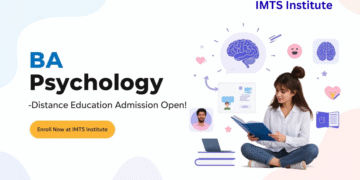MSc Microbiology Distance Education Admission 2025 is a 2-year postgraduate program designed for students who want to explore the world of microorganisms and their applications. At MIT University Sikkim, the course is also available in regular mode with four semesters covering subjects like immunology, microbial genetics, food microbiology, and industrial microbiology. To apply, candidates must have a BSc in Life Sciences, Biotechnology, or Microbiology with at least 50% marks (45% for SC/ST/OBC). The program includes semester exams, research-based projects, and lab work, giving students both theoretical and practical learning experience.
The application fee ranges from ₹500–1,000, while the yearly fee is between ₹18,000 and ₹59,000 depending on the university. The last date for admission is 30 September 2025. For students seeking flexibility, the program is also offered in distance mode at Subharti University, where online classes and digital study materials are provided. After completing MSc Microbiology, graduates can work as clinical microbiologists, lab scientists, food safety officers, or research analysts, with salaries starting from ₹3–4 LPA. This course is ideal for those aiming to combine scientific knowledge with practical applications in healthcare, research, and industry.
MSc Microbiology Distance Education Admission Process 2025-26
- Educational: Candidates require BSc degree in relevant subjects including Life Sciences, Microbiology, Biotechnology, or Biology with minimum 50% aggregate marks from UGC-recognized universities.
- Application Procedure: Complete online registration through institutional websites, submit required documents digitally, and pay application fees ranging from INR 500-1,500 for processing admission requests.
- Merit-Based Selection: Universities evaluate applications based on academic performance in qualifying examinations without requiring entrance tests for MSc Microbiology Distance Education Admission 2025.
- Documentation Requirements: Upload scanned copies of degree certificates, mark sheets, government-issued identity proof, and passport-sized photographs during application submission process.
- Counseling Support: Institutions provide free career guidance sessions to help students select appropriate specializations and understand course structure, curriculum, and career prospects.
MSc Microbiology Distance Education Admission Overview
- Course Objectives: The program develops comprehensive understanding of microorganisms, their biological processes, and practical applications in medicine, industry, and environmental science through structured learning modules.
- Institutional Benefits: Distance education providers offer flexible scheduling, digital learning resources, virtual laboratory access, and continuous academic support for working professionals and homemakers.
- Program Structure: Two-year curriculum divided into four semesters with minimum completion time of 24 months and maximum extension period of 60 months for slow-paced learners.
- Admission Criteria: Candidates need 45-50% marks in graduation with subject background in biological sciences, chemistry, or related disciplines from accredited educational institutions.
- Subject Coverage: Core curriculum includes Microbial Physiology, Genetics, Immunology, Industrial Applications, Environmental Microbiology, and Advanced Research Techniques with practical case studies.
- Learning Flexibility: Online delivery methods accommodate diverse schedules through recorded lectures, digital study materials, and virtual interaction sessions with faculty members.
- Employment Prospects: Graduates pursue careers as Research Scientists, Quality Control Analysts, Clinical Microbiologists, and Environmental Consultants in pharmaceutical, biotechnology, and healthcare sectors.
- University: Reputable institutions including IMTS Institute, William Carey University, Mangalayatan University, and NIILM University offer accredited programs with industry-relevant curriculum.
What is MSc Microbiology Distance Education?
MSc Microbiology Distance Education represents an advanced postgraduate program designed to provide comprehensive knowledge about microorganisms through flexible learning methodologies. Students explore the intricate world of bacteria, viruses, fungi, and protozoa while understanding their applications across multiple scientific disciplines. The program emphasizes practical applications in pharmaceutical development, medical diagnostics, food safety, and environmental conservation.
Distance learning platforms deliver course content through digital modules, virtual laboratories, and interactive sessions that accommodate diverse learning schedules. Students study advanced topics including molecular biology, genetic engineering, bioinformatics, and bioprocess technology. The curriculum integrates theoretical foundations with real-world case studies from industry and research settings.
MSc Microbiology Distance Education prepares students for specialized roles in biotechnology firms, pharmaceutical companies, research institutions, and healthcare facilities. Graduates develop expertise in microbial analysis, quality control procedures, and research methodologies essential for professional advancement in scientific careers.
Why Choose IMTS MSc Microbiology Distance Education?
- Academic Excellence: Faculty members possess extensive research experience and industry expertise, providing students with current knowledge and practical insights relevant to MSc Microbiology Distance Education career requirements.
- Flexible Learning Environment: Online platforms accommodate working professionals and homemakers through self-paced study options, weekend sessions, and convenient examination scheduling that fits diverse lifestyles.
- Industry Connections: Strong partnerships with pharmaceutical companies, research laboratories, and biotechnology firms facilitate internship opportunities, project collaborations, and employment placements for graduating students.
- Comprehensive Support Services: Students receive continuous academic guidance, technical assistance, library access, and career counseling throughout their MSc Microbiology Distance Education journey for optimal learning outcomes.
- Affordable Education: Cost-effective fee structures with installment payment options make quality postgraduate education accessible to students from various economic backgrounds without compromising academic standards.
MSc Microbiology Distance Education Admission Eligibility Criteria
- Academic Qualifications: Applicants must possess Bachelor of Science degree in Life Sciences, Microbiology, Biotechnology, Biology, Chemistry, or related subjects from universities recognized by University Grants Commission.
- Minimum Performance Standards: Students require 50% aggregate marks in undergraduate studies with relaxation of 5% for SC/ST category candidates according to government reservation policies and institutional guidelines.
- Age Requirements: No upper age limit exists for admission, making the program accessible to fresh graduates, working professionals, career changers, and homemakers seeking educational advancement.
- Subject Prerequisites: Prior coursework in Microbiology, Biochemistry, Molecular Biology, or Genetics during graduation strengthens application credentials though not mandatory for MSc Microbiology Distance Education Admission 2025.
- Professional Experience: While work experience is not required, candidates with laboratory background, research exposure, or industry experience receive additional consideration during the selection process.
- Language Competency: Basic English proficiency is essential as course materials, lectures, examinations, and research projects are conducted exclusively in English medium for effective communication.
MSc Microbiology Distance Learning Fee
- Total Program Investment: Complete course fees range from INR 36,000 to INR 1,18,000 covering entire two-year duration depending on institutional reputation and specialization tracks offered.
- Registration Charges: Initial application fee of INR 500 to INR 1,500 required during online application submission for document processing and preliminary evaluation procedures.
- Course Materials Cost: Study material fees of INR 500 to INR 1,000 cover comprehensive textbooks, digital resources, and supplementary learning materials provided throughout the program.
- Assessment Expenses: Semester examination fees of INR 1,000 per term include evaluation of assignments, practical assessments, and final examinations conducted by respective universities.
- Additional Requirements: Supplementary costs of INR 3,000 to INR 5,000 encompass digital library access, virtual laboratory sessions, project work expenses, and technical support services.
- Payment Flexibility: Semester-wise installment options available to ease financial burden on students with structured payment schedules aligned with academic calendar requirements.
Benefits of Choosing IMTS MSc Microbiology Distance Learning Admission
- Schedule Flexibility: MSc Microbiology Distance Education accommodates working professionals and homemakers through convenient timing, weekend classes, and self-paced learning modules that fit personal and professional commitments.
- Expert Faculty Access: Experienced microbiologists and industry professionals provide personalized mentorship, research guidance, and career counseling to ensure student success throughout the academic journey.
- Modern Curriculum Design: Updated course content covers emerging technologies including genetic engineering, bioinformatics, molecular diagnostics, and biotechnology applications aligned with current industry requirements and research trends.
- Comprehensive Academic Support: Students benefit from digital library resources, virtual laboratory experiences, technical assistance, doubt resolution sessions, and peer interaction opportunities for enhanced learning outcomes.
- Career Development Services: Placement assistance, resume building workshops, interview preparation sessions, and industry networking opportunities help graduates secure positions in pharmaceutical, biotechnology, and research sectors.
List of Popular University MSc Microbiology Distance Learning Admission
| Name of University | Eligibility | Approx Fees |
|---|---|---|
| IMTS Institute | BSc Life Sciences with 50% marks | INR 20,000/year |
| William Carey University | BSc relevant subjects with 45% marks | INR 28,000/year |
| Mangalayatan University | BSc Microbiology/Biotechnology with 50% marks | INR 35,000/year |
| NIILM University | BSc Science with 50% marks | INR 30,000/year |
MSc Microbiology Distance Learning Admission: How to Apply for the IMTS Institute?
- Website Navigation: Access www.imtsinstitute.com and locate MSc Microbiology Distance Education program section to review comprehensive course details, admission requirements, and application procedures.
- Account Registration: Create secure student profile by providing accurate personal information, educational background, and contact details for receiving important communication regarding admission status.
- Application Completion: Fill detailed online form with academic qualifications, work experience, specialization preferences, and personal statement explaining motivation for pursuing MSc Microbiology Distance Education Admission 2025.
- Document Upload: Submit high-quality scanned copies of degree certificates, transcripts, identity verification, photographs, and category certificates through secure institutional portal.
- Fee Payment Processing: Complete application fee payment of INR 500-1,500 using available online methods including debit cards, credit cards, net banking, or digital wallet options.
- Counseling Session Scheduling: Book complimentary career guidance appointment with academic advisors to discuss program structure, specialization options, and career opportunities in microbiology field.
- Application Submission: Review entered information thoroughly, submit completed application, and receive unique reference number for tracking admission status throughout the evaluation process.
- Status Monitoring: Regular follow-up through student portal using login credentials to check application progress, document verification status, and admission decision communications.
Documents Required
- Academic Credentials: Original Bachelor’s degree certificate with official transcripts showing subject-wise marks, overall percentage, and graduation completion from recognized university or college.
- Performance Records: Complete mark sheets from all semesters or consolidated academic transcript demonstrating consistent performance throughout undergraduate studies in relevant subjects.
- Identity Verification: Valid government-issued identification including Aadhaar Card, PAN Card, Passport, or Driving License for official verification and record maintenance purposes.
- Photographic Documentation: Recent passport-size photographs with white background meeting official specifications for identity cards, certificates, and administrative requirements throughout the program.
- Category Documentation: Caste certificate from competent authority if applying under reserved categories for fee concessions, mark relaxations, or special considerations during admission process.
- Transfer Certificate: Original migration certificate from previous educational institution required for students changing universities or completing graduation from different academic boards.
MSc Microbiology Career Prospects Distance Learning
- Research Scientist Opportunities: Pharmaceutical companies, biotechnology firms, and academic institutions offer research positions with starting salaries of INR 3-5 LPA for MSc Microbiology Distance Education graduates.
- Clinical Laboratory Roles: Hospitals, diagnostic centers, and pathology laboratories hire Clinical Microbiologists and Laboratory Technicians with compensation packages ranging INR 2.5-4 LPA initially.
- Quality Assurance Positions: Food processing industries, pharmaceutical companies, and cosmetic manufacturers employ Quality Control Analysts ensuring product safety with salaries of INR 3-6 LPA.
- Environmental Consulting Career: Government agencies and private firms engage Environmental Consultants for pollution control and monitoring projects offering compensation of INR 4-7 LPA.
- Academic Teaching Opportunities: Educational institutions recruit lecturers and professors after advanced qualifications with starting salaries of INR 3-5 LPA plus research opportunities.
- Biotechnology Industry Roles: Companies involved in fermentation technology, bioprocess development, and product innovation offer attractive packages ranging INR 4-8 LPA for experienced professionals.
MSc Microbiology Distance Education Structure and Curriculum
Year-1
| Subject Code | Subject Name | Credits |
|---|---|---|
| MIC101 | Fundamentals of Microbiology and Diversity | 4 |
| MIC102 | Microbial Physiology and Biochemistry | 4 |
| MIC103 | Medical and Clinical Microbiology | 4 |
| MIC104 | Immunology and Diagnostic Methods | 4 |
| MIC105 | Research Methodology and Biostatistics | 4 |
Year-2
| Subject Code | Subject Name | Credits |
|---|---|---|
| MIC201 | Industrial Microbiology and Biotechnology | 4 |
| MIC202 | Environmental and Agricultural Microbiology | 4 |
| MIC203 | Food Microbiology and Safety | 4 |
| MIC204 | Molecular Biology and Genetic Engineering | 4 |
| MIC205 | Research Project and Dissertation | 6 |
Conclusion
MSc Microbiology Distance Education Admission 2025 provides excellent opportunities for working professionals and homemakers seeking career advancement in scientific fields. The program offers comprehensive coverage of microbiology fundamentals, advanced applications, and research methodologies through flexible learning platforms. Students can expect affordable education with fees ranging from INR 18,000 to INR 59,000 annually while maintaining their existing commitments.
Universities maintain high academic standards with UGC-DEB approval ensuring degree recognition for employment and further studies. Application deadlines typically fall between May and August 2025 with merit-based selection processes. Graduates can pursue rewarding careers in pharmaceutical industries, research institutions, and healthcare sectors with starting salaries of INR 3-4 LPA. The combination of theoretical knowledge, practical applications, and flexible scheduling makes MSc Microbiology Distance Education an ideal choice for academic and professional growth.
FAQ
Question: What are the eligibility requirements for MSc Microbiology Distance Education Admission 2025?
Answer: Candidates need BSc degree in Life Sciences, Microbiology, Biotechnology, or related subjects with minimum 50% marks from recognized universities. SC/ST candidates receive 5% mark relaxation and no upper age limit applies for admission.
Question: Why should I choose IMTS Institute for MSc Microbiology Distance Education?
Answer: IMTS provides flexible online learning, experienced faculty guidance, comprehensive study materials, and affordable fees starting from INR 20,000 annually. Students receive free career counseling, placement assistance, and continuous academic support throughout their studies.
Question: What career opportunities exist after completing MSc Microbiology Distance Education?
Answer: Graduates work as Research Scientists, Clinical Microbiologists, Quality Control Analysts, Environmental Consultants, and Laboratory Supervisors in pharmaceuticals, biotechnology, healthcare, and research sectors with starting salaries of INR 3-4 LPA.
Question: What is the fee structure for MSc Microbiology Distance Education programs?
Answer: Total program fees range from INR 36,000 to INR 1,18,000 for two years depending on institution and specialization. Application fees cost INR 500-1,500 with flexible payment options available for student convenience.
Question: How long does MSc Microbiology Distance Education take to complete?
Answer: The program requires 2 years with 4 semesters for completion with minimum duration of 24 months and maximum extension of 60 months. Students can progress at suitable pace through flexible online learning platforms.
Question: When do applications close for MSc Microbiology Distance Education Admission 2025?
Answer: Application deadlines vary between May 15 to August 30, 2025 across different institutions. Students should apply early as admission is merit-based and seats are limited in most universities offering the program.



















